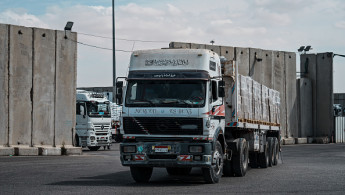Aid shipments to Gaza 'squeezed out' by commercial deliveries
Aid shipments to southern Gaza are being 'squeezed out' by commercial delivery trucks, aid groups have said, despite growing need for humanitarian relief in Rafah and its surroundings in the wake of Israel's ground operations there.
Humanitarian relief deliveries have reduced by two-thirds since Israel’s operation began on 7 May, UN figures have shown, though the number of trucks entering Gaza were higher last month compared to April, Israeli officials said, according to The Guardian.
This can be attributed to the increased entry of commercial trucks into the enclave after Israel lifted a ban on the sale of food and other goods to Gaza from Israel and the occupied West Bank in May, Reuters said last week.
As a result, food markets are now more present in Gaza, although the cost of products is significantly higher than pre-war prices, leaving Palestinians unable to afford essential goods in times of war.
Aid groups told The Guardian that while the Karam Abu Salem crossing was officially open, commercial trucks were being prioritised over aid delivering relief to Palestinians.
According to UN data, 5,000 aid trucks entered Gaza in April, but just a few hundred trucks entered the war-torn enclave during the last three weeks of May.
Ami Shaked, the manager of the crossing complex where shipments are checked by Israeli authorities, confirmed to the UK newspaper that commercial trucks were outnumbering those carrying humanitarian relief, in a phenomenon motivated by logistics companies’ commercial and monetary interests.
Aid organisations are also met with obstacles such as a lack of permits from the Israeli military, limited capacity to enter Gaza, precarious conditions due to military activity, and commercial trucks taking up space in collection areas as they load and unload.
Juliette Touma, a communications director, said: "The Israeli military operation and activities since 6 May have been crippling to the humanitarian response."
Moreover, far-right activists have carried out a string of attacks on humanitarian trucks, looting them, attacking drivers and throwing food items onto the ground.
Commercial deliveries, however, can complement humanitarian aid, as it would contribute to a wider variety of food options.
Although if commercial delivery vastly outnumbers humanitarian ones, then the hunger crisis will only deepen, Touma said.
Palestinians in Gaza are also more cash-strapped than ever, with little access to cash amid war and months of unemployment.
The US-built pier in Gaza, designed to transport essentials to war-torn Gaza, has also come under criticism, as it can only deliver very little aid that could be brought in by trucks. The pier is also damaging its surroundings, satellite images revealed last week, and can only operate in good weather conditions.
Israel has pounded the Gaza Strip on an almost-daily basis since 7 October, killing at least 36,550 Palestinians as of Tuesday, in its brutal military campaign.
Israel has targeted refugee camps, schools, hospitals and residential buildings, killing hundreds of Palestinians every day, with many labelling its actions as genocide.
Rafah, Gaza’s southernmost city, has been targeted by an Israeli military campaign since 7 May, carried out in violation of an International Court of Justice order requesting a halt to attacks.
The city has been subject to multiple massacres since, notably the Tel al-Sultan massacre on 26 May, which killed at least 45 Palestinians, after Israeli missiles set ablaze a camp for the displaced.





 Follow the Middle East's top stories in English at The New Arab on Google News
Follow the Middle East's top stories in English at The New Arab on Google News
![Both Hamas and the Palestinian Authority welcomed the ICC arrest warrants [Getty]](/sites/default/files/styles/image_330x185/public/2024-11/GettyImages-2178351173.jpg?h=199d8c1f&itok=TV858iVg)

